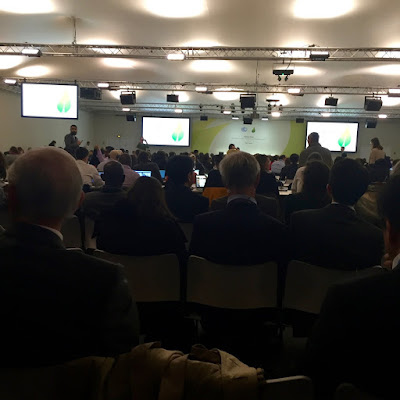As a continuation of yesterday’s post, I wanted to focus in on the important role of the facilitators in text editing and negotiation sessions.
For each of the spin-offs and informal meetings of the spin-offs, two delegates temporarily take off their negotiating hats and become moderators for the discussion among country delegations. Their job is to guide discussions and make sure that countries stay on task and deliver a revised text within the specified deadline. While one co-facilitator calls on country parties and reacts to their comments, the other integrates their feedback into the text (which is displayed on screens throughout the room) and notes raised country plates so countries can intervene in the correct order.
 |
| Participants crowd into the overflow room for one of the final meetings of the contact group tasked with revising the draft Agreement and Decision texts. |
What makes the job of a co-facilitator uniquely challenging is that he or she is moderating a discussion among sovereign countries. The co-facilitator cannot refuse a request made by a delegation. He or she can only try to provide guidance when the conversation seems to be going off track. As one facilitator said yesterday, “Yes, you are sovereign and have the right to reintroduce text, but going down this path may not lead us to the product we want tomorrow.”
I have also heard several facilitators say, “I am in your hands.” A discussion on finance yesterday was starting to spin in circles, and several delegations sought advice from the facilitator on the best way to move forward. In a rather poetic response, the facilitator said that while he can make suggestions, it will not make a difference if countries are not willing to engage and cooperate with one another. A facilitator can provide advice, but it is ultimately up to countries what they will achieve and what progress will be made in the drafting sessions.
That being said, the personality and approach of a facilitator can impact the direction of discussions. In one of the final meetings of the contact group, the facilitator was audibly stressed about the remaining time and was trying to quickly move countries through a final read through of the text. This approach backfired. Because country delegations were confused about the process for providing comments on different sections of the text, a large part of the session ended up focusing on procedures instead of comments on the actual text.
Finally, as neutral parties, facilitators are able to try and help move the negotiations forward when things are not advancing quickly enough. Yesterday, for example, the different spin-off facilitators worked late into the night to produce a bridging proposal that shortened the negotiating text by ten pages. Countries agreed to use this shortened text as the basis for future discussions (while, of course, wanting to provide feedback on the key points they felt the facilitators did not capture).
As of Saturday morning, the initial revision process for the agreement has closed, and it is now up to Ministers to take us towards an ambitious agreement.
To learn more, the following NPR article does a really great job of introducing the two co-chairs of the Ad Hoc Working Group on the Durban Platform for Enhanced Action (ADP). The ADP was tasked, both over the past year and during the first week of negotiations, with preparing the draft agreement that will be negotiated by ministers next week. http://www.npr.org/2015/05/11/404200241/two-guys-in-paris-aim-to-charm-the-world-into-climate-action
To learn more, the following NPR article does a really great job of introducing the two co-chairs of the Ad Hoc Working Group on the Durban Platform for Enhanced Action (ADP). The ADP was tasked, both over the past year and during the first week of negotiations, with preparing the draft agreement that will be negotiated by ministers next week. http://www.npr.org/2015/05/11/404200241/two-guys-in-paris-aim-to-charm-the-world-into-climate-action
No comments:
Post a Comment
Note: Only a member of this blog may post a comment.